|
|
|
Sort Order |
|
|
|
Items / Page
|
|
|
|
|
|
|
| Srl | Item |
| 1 |
ID:
086834
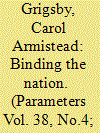

|
|
|
|
|
| Publication |
2009.
|
| Summary/Abstract |
The United States has been at war for more than seven years, and the end to its struggle against religious extremism is nohere in sight. Thus far the majority of the campaign has been waged by the military. With the prolonged counterinsurgencies in Afghanistan and Iraq has come a growing realization that more alienated youth could appear on the world's battlefields unless the united States begins to win more descisively the war of ideas.
|
|
|
|
|
|
|
|
|
|
|
|
|
|
|
|
| 2 |
ID:
058449
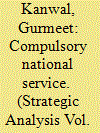

|
|
|
| 3 |
ID:
103234
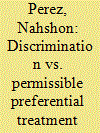

|
|
|
|
|
| Publication |
2011.
|
| Summary/Abstract |
This essay analyzes the allocation policies enacted by Haifa University over its dormitories. While seemingly a trivial case, it is actually a key example of an ongoing legal and social struggle between Arab and Jewish citizens of Israel. The policy provides preferential treatment for veterans of IDF and national service. Adalah challenged this policy in an Israeli court which accepted the petition. However, the legislation was later changed to allow such preferential treatment. This article examines two issues: national service for Arabs, and the preferential treatment practised by Haifa University I will argue that both opening national service for Arabs, and the policy of Haifa University are justified, however, the analysis will demonstrate the complexity of both subjects, and the article concludes with suggestions for both issues.
|
|
|
|
|
|
|
|
|
|
|
|
|
|
|
|
| 4 |
ID:
122068
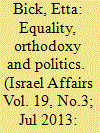

|
|
|
|
|
| Publication |
2013.
|
| Summary/Abstract |
National service was a controversial issue in Israel in the early years of the state. A law requiring religious girls exempted from the military to do two years of mandatory civic service was passed in August 1953 and never implemented. This article examines the political controversy surrounding the adoption of the national service law and concludes that David Ben-Gurion advanced the law mainly for political reasons in order to counterbalance concessions made to the orthodox. Moreover, consistent with his mamlachtiyut (statist) philosophy, he was unwilling to consider any compromise proposals other than a mandatory government-run programme. Pressure from the religious parties caused his successor, Moshe Sharett, to concede on the implementation details, voiding the law of content. Subsequent governments acceded to orthodox demands to freeze the law. In 1971, a more pragmatic Labour government headed by Golda Meir instituted a programme of voluntary national service which provided needed manpower to the development towns and fulfilled the wish of girls from the religious Zionist sector to give service to the nation.
|
|
|
|
|
|
|
|
|
|
|
|
|
|
|
|
| 5 |
ID:
143622
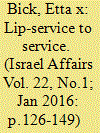

|
|
|
|
|
| Summary/Abstract |
This article explores the social and political dynamics behind the various legislative proposals to establish a civic national service programme in Israel, and the role of Israel’s High Court as a catalytic force for changing policy on this controversial issue. The idea of civic national service for those not inducted into the Israel military has been a controversial issue in Israel since the early years of the state. While Jews and Druze were inducted into the armed forces, Israeli Arabs, religious women and ultra-orthodox yeshiva students were either exempted or deferred from service. Members of Knesset primarily from small parties in the opposition proposed private member bills to establish an alternative civic service for those not serving in the army; however, Israel’s governments rejected these proposals and only in the case of religious Zionist women did the government establish a voluntary programme. Political considerations and coalition politics as well as an interest in protecting the unrivalled predominance of the military (IDF) in Israeli society led successive Israeli governments to maintain the status quo. Only the intervention of the High Court obliged the government to review its policy and take action.
|
|
|
|
|
|
|
|
|
|
|
|
|
|
|
|
| 6 |
ID:
006023
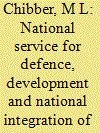

|
|
|
|
|
| Publication |
Meerut, Kartikeya Publications, 1995.
|
| Description |
x, 272p.
|
| Standard Number |
8185823073
|
|
|
|
|
|
|
|
|
|
|
|
Copies: C:1/I:0,R:0,Q:0
Circulation
| Accession# | Call# | Current Location | Status | Policy | Location |
| 036906 | 355.22363/CHI 036906 | Main | On Shelf | General | |
|
|
|
|
| 7 |
ID:
167179
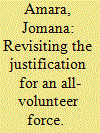

|
|
|
|
|
| Summary/Abstract |
In 1968, President Nixon established the Commission on an All-Volunteer Armed Force, or the Gates Commission, which served as the impetus and justification for an All-Volunteer Force (AVF). At the end of its deliberations, the commission recommended abolishing the draft and transforming the U.S. military into a force of volunteers beginning in 1973. Interestingly, the debate regarding the merits of both systems appeared to be largely economic – with cost–benefit analysis playing the primary role. Lately, we are beginning to see a new, politically-motivated impetus for returning to a “system of national service.” The ideas spurring this debate are many: the need to reaffirm the nation state, the commitment of citizens to the state, political ownership and oversight of the forces, the need for social equity in serving the nation, limiting the support for armed conflict by burden-sharing among citizens, and equitably spreading the personal cost of war.
|
|
|
|
|
|
|
|
|
|
|
|
|
|
|
|
| 8 |
ID:
187424
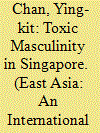

|
|
|
|
|
| Summary/Abstract |
The #MeToo Movement, which originated in the USA against sexual harassment and violence, has caught on in Singapore. This article suggests that the recent debate on toxic masculinity in the country, brought to public attention in a speech by Corinna Lim, chief of the Association of Women for Action and Research (AWARE), is an extension of the #MeToo Movement. The debate on toxic masculinity has largely revolved around the issue of whether the mandatory National Service (NS), which all Singaporean men have to perform, is a site of toxic masculinity. This article is a preliminary attempt to connect the dots and examine the implications of the debate for civil society, NS, and women’s activism in contemporary Singapore.
|
|
|
|
|
|
|
|
|
|
|
|
|
|
|
|
| 9 |
ID:
162206
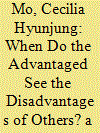

|
|
|
|
|
| Summary/Abstract |
Are there mechanisms by which the advantaged can see the perspectives of the disadvantaged? If advantaged individuals have prolonged engagement with disadvantaged populations and confront issues of inequality through national service, do they see the world more through the lens of the poor? We explore this question by examining Teach For America (TFA), as TFA is a prominent national service program that integrates top college graduates into low-income communities for two years and employs a selection model that allows for causal inference. A regression discontinuity approach, utilizing an original survey of over 32,000 TFA applicants and TFA’s selection data for the 2007–2015 application cycles, reveals that extended intergroup contact in a service context causes advantaged Americans to adopt beliefs that are closer to those of disadvantaged Americans. These findings have broad implications for our understanding of the impact of intergroup contact on perceptions of social justice and prejudice reduction.
|
|
|
|
|
|
|
|
|
|
|
|
|
|
|
|
|
|
|
|
|